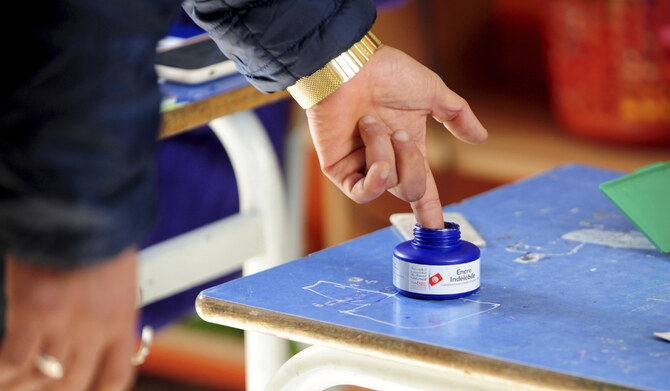TUNIS, Tunisa: Election officials in Tunisia doubled down Monday on their decision to deny accreditation to some election observer groups, who said the move shows that the October presidential contest in the North African country won’t be free and fair.
The Independent High Authority for Elections, or ISIE, said in a statement that several civil society groups that had applied for accreditation had received a “huge amount” of foreign funding of a “suspicious origin” and therefore had to be denied accreditation to observe the election.
Though ISIE did not explicitly name the groups, one of its commission members said last weekend that it sent formal allegations against two specific groups to Tunisia’s public prosecutor, making similar claims that they took funding from abroad.
The two organizations, I-Watch and Mourakiboun (which means “Observers” in Arabic) are not the first civil society groups to be pursued by authorities in Tunisia. Under President Kais Saied, NGOs have increasingly been targeted for their work, which spans from aid for migrants to human rights to local development efforts.
Saied has throughout his tenure accused civil society groups of having nefarious motives and being puppets of foreign countries critical of his style of governance. He has alleged that NGOs that receive funding from abroad intend to disrupt the North African nation’s social fabric and domestic politics.
Some of the groups targeted have increasingly criticized authorities’ decisions to arrest potential candidates and bar others from running over the past several months. Other groups, including I-Watch and Mourakiboun, have applied for accreditation to act as independent election observers for the October 6 vote.
In a statement, I-Watch blasted ISIE’s efforts to call its funding into question and called it “a desperate attempt to distract public opinion by hiding the violations it committed and its failure to implement law.”
Siwar Gmati, a member of the watchdog group, told The Associated Press that any foreign funding that I-Watch received for specific projects in the past was provided in accordance with Tunisian law and disclosed transparently.
“We haven’t asked donors for funding relating to this electoral monitoring mission” she said, denying ISIE’s claims.
Financial disclosures published on I-Watch’s website show some of its past programs have been bankrolled by groups such as Transparency International and Deutsche Welle Akademie (DW) as well as the European Union and the US Embassy.
Gmati said I-Watch no longer accepts US funding and is currently engaged in two projects with the EU it received funding for last year.
The quarrel with prospective election observers is the latest in a string of controversies that have plagued ISIE in recent months, during which critics have accused it of lacking independence and acting on behalf of the president. Last week, dozens of Tunisians critical of the commission’s role protested outside its headquarters.
Tensions rose last week after the electoral authority published a final list of candidates that included Saied and only two challengers, dismissing a court order requiring that it reinstate three others it had previously barred from running.
The electoral commission argued that it didn’t receive the court’s ruling by the legal deadline. Critics called the dismissal politically motivated and a court spokesperson told local radio that ignoring a court order in such a way was unprecedented in Tunisia.
ISIE denied I-Watch’s application to observe the election in July and the NGO appealed and requested for clarifications in August. Despite ISIE’s public statements, Gmati said that it had not yet responded directly to I-Watch’s requests.
I-Watch called ISIE’s public statements a “flimsy pretext” to exclude election monitors from observing the Oct. 6 presidential vote.
“It has clearly become involved in the presidency’s program and has become a tool of the dictatorship,” the watchdog group said of the election authority.
The conflict between Tunisia and election observation groups is the latest matter to stain this year’s election season in Tunisia, where presidential candidates have been arrested, barred from participation or denied a place on the ballot. It marks a departure from elections the country has held since it became a bastion for democracy after toppling its longtime dictator in the 2011 Arab Spring. Observers have previously praised Tunisia for holding free and fair elections.
Since Saied took power, however, things have changed for Tunisia’s once-vibrant NGO scene. In 2022, he targeted civil society groups that accept foreign funding, and has said that nobody has the right to interfere in Tunisia’s politics and choices.























